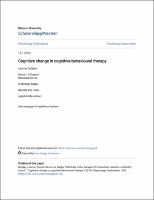Please use this identifier to cite or link to this item:
https://hdl.handle.net/20.500.12202/10072| Title: | Cognitive change in cognitive-behavioural therapy v. pharmacotherapy for adult depression: a longitudinal mediation analysis |
| Authors: | Quigley, Leanne Dozois, David J. A. Bagby, R. Michael Lobo, Daniela S. S. Ravindran, Lakshmi Quilty, Lena C. 0000-0002-3676-4083 |
| Keywords: | Depression -- Therapy -- In Adulthood Cognitive Therapy -- In Adulthood Antidepressive Agents -- Therapeutic Use -- In Adulthood Cognition Disorders -- Prevention and Control Human Prospective Studies Randomized Controlled Trials Random Assignment Treatment Outcomes Pretest-Posttest Design Cognition Adult |
| Issue Date: | 1-Oct-2019 |
| Publisher: | Western University |
| Citation: | Quigley, L., Dozois, D. J. A., Bagby R.M., Lobo, D. S. S., Ravindran, L., & Quilty, L. C. (2019). Cognitive change in cognitive-behavioural therapy v. pharmacotherapy for adult depression: A longitudinal mediation analysis. Psychological Medicine, 49(15), 2626-2634. doi:10.1017/S0033291718003653 |
| Series/Report no.: | Psychological Medicine;49(15) |
| Abstract: | Background: Although cognitive-behavioural therapy (CBT) is a well-established treatment for adult depression, its efficacy and efficiency may be enhanced by better understanding its mechanism(s) of action. According to the theoretical model of CBT, symptom improvement occurs via reductions in maladaptive cognition. However, previous research has not established clear evidence for this cognitive mediation model. Methods: The present study investigated the cognitive mediation model of CBT in the context of a randomized controlled trial of CBT v. antidepressant medication (ADM) for adult depression. Participants with major depressive disorder were randomized to receive 16 weeks of CBT (n = 54) or ADM (n = 50). Depression symptoms and three candidate cognitive mediators (dysfunctional attitudes, cognitive distortions and negative automatic thoughts) were assessed at week 0 (pre-treatment), week 4, week 8 and week 16 (post-treatment). Longitudinal associations between cognition and depression symptoms, and mediation of treatment outcome, were evaluated in structural equation models. Results: Both CBT and ADM produced significant reductions in maladaptive cognition and depression symptoms. Cognitive content and depression symptoms were moderately correlated within measurement waves, but cross-lagged associations between the variables and indirect (i.e. mediated) treatment effects were non-significant. Conclusions: The results provide support for concurrent relationships between cognitive and symptom change, but not the longitudinal relationships hypothesized by the cognitive mediation model. Results may be indicative of an incongruence between the timing of measurement and the dynamics of cognitive and symptom change. |
| Description: | Research article / Open access |
| URI: | https://www.semanticscholar.org/paper/Cognitive-change-in-cognitive-behavioural-therapy-a-Quigley-Dozois/5e4e75c17513e52a4c56261c25d113387d083549 https://ir.lib.uwo.ca/psychologypub/185 https://hdl.handle.net/20.500.12202/10072 |
| ISSN: | 0033-2917 |
| Appears in Collections: | Ferkauf Graduate School of Psychology: Faculty Publications |
Files in This Item:
| File | Description | Size | Format | |
|---|---|---|---|---|
| Quigley 2019 OA Cognitive change in cognitive-behavioural therapy.pdf | 314.47 kB | Adobe PDF |  View/Open |
This item is licensed under a Creative Commons License

